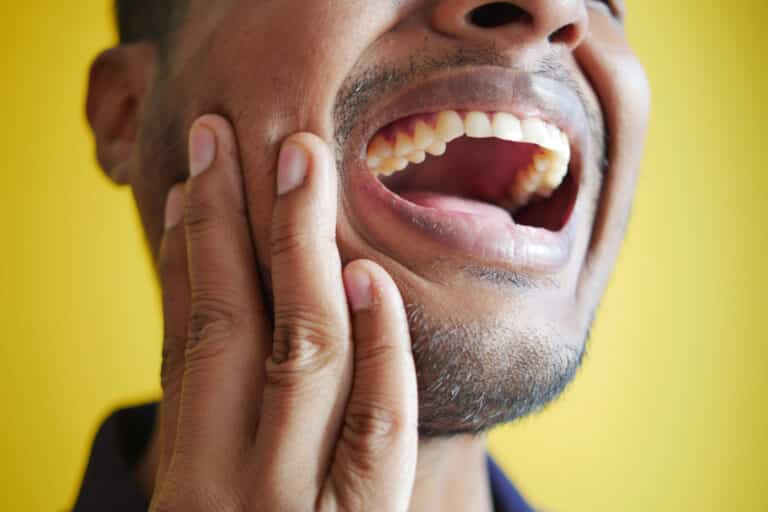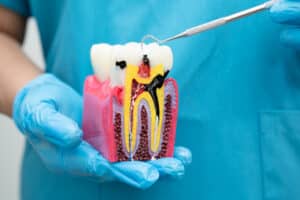Why Does My Tooth Hurt When I Bite Down But No Cavity?
Many patients are puzzled when they experience tooth pain without an obvious cavity. This situation can be particularly frustrating since cavities are often assumed to be the primary cause of tooth pain.
However, the mouth is a complex system, and various conditions can trigger pain when biting down, even when your teeth appear cavity-free on X-rays. Let’s explore some common causes:
- Cracked Tooth Syndrome A small crack in your tooth might not be visible on X-rays but can cause sharp pain when biting. These hairline fractures often develop gradually from:
- Grinding or clenching teeth
- Biting hard foods
- Temperature changes in the mouth
- Previous dental work
- Dental Trauma Even minor injuries can cause inflammation around the tooth’s ligaments, making it sensitive to pressure. This trauma might occur from something as simple as biting down too hard on an unexpected olive pit or from a more obvious injury like a sports accident.
- High or Misaligned Filling Sometimes a dental filling that’s slightly too high can cause pain when biting down. This occurs because the filling disrupts your natural bite pattern, placing excessive pressure on certain areas of the tooth.
- Teeth Grinding (Bruxism) Nighttime grinding can make teeth sensitive to pressure during the day. This habit can gradually wear down tooth enamel and create sensitivity that’s particularly noticeable during meals.
Why Does My Back Tooth Hurt When I Bite Down?
Back teeth bear the brunt of our chewing forces and are particularly susceptible to certain types of pain. Their location and primary role in grinding food make them vulnerable to specific issues that might not affect front teeth in the same way. Here are the main culprits:
- Root Inflammation The pressure of chewing can irritate inflamed root tissue, causing sharp pain. This inflammation often results from deep decay, injury, or previous dental work.
- Wisdom Tooth Problems Impacted or emerging wisdom teeth can cause pressure and pain in surrounding teeth. The shifting and crowding that occurs during wisdom tooth eruption can affect your entire bite.
- Sinus Issues Upper back tooth pain might actually be related to sinus pressure or infection. The roots of upper molars often sit very close to the sinus cavities, making it difficult to distinguish between dental and sinus-related pain.
Why Does My Front Tooth Hurt When I Bite Down?
Front teeth serve different functions than back teeth and are exposed to unique stresses. Their prominent position makes them more vulnerable to certain types of problems:
- Traumatic Injury Front teeth are more susceptible to injury from accidents or sports. Their exposed position means they’re often the first teeth to take impact during falls or collisions.
- Gum Recession Exposed root surfaces can lead to sensitivity and pain. Front teeth are particularly prone to gum recession from aggressive brushing or periodontal disease.
- Bite Changes Changes in your bite alignment can put excess pressure on front teeth. This might occur from shifting teeth, new dental work, or worn down back teeth.
When Should You See a Dentist?
Dental pain is your body’s way of signaling that something isn’t right. While some minor tooth sensitivity might resolve on its own, certain symptoms warrant immediate professional attention. Here’s when you should schedule an appointment:
Seek professional care if you experience:
- Pain lasting more than a few days
- Sharp or severe pain when biting
- Swelling around the painful tooth
- Temperature sensitivity
- Difficulty eating or speaking
Temporary Relief Measures
While it’s important to see a dentist for persistent tooth pain, there are several ways to manage your discomfort in the meantime. These temporary solutions can help provide relief while you wait for your appointment:
- Avoid chewing on the affected side
- Use sensitive toothpaste
- Take over-the-counter pain relievers
- Apply a cold compress for swelling
- Stick to soft foods
Prevention Tips
Prevention is always better than cure when it comes to dental health. By following these preventive measures, you can significantly reduce your risk of developing tooth pain and other dental problems:
- Wearing a nightguard if you grind your teeth
- Avoiding very hard foods
- Using proper brushing technique
- Maintaining regular dental check-ups
- Addressing dental issues promptly
Professional Treatment Options
At Verber Dental East, we understand that each case of tooth pain is unique and requires a personalized approach. Our comprehensive treatment options are designed to address the root cause of your pain, not just mask the symptoms:
- Bite adjustment
- Crown placement
- Root canal therapy
- Night guard fitting
- Filling replacement or adjustment
Pain-Free Dental Care
Ready to get ready of your tooth pain? Schedule an appointment with our experienced team today. We’ll evaluate your bite and provide insight into why you are experiencing pain.
Click here to schedule your appointment, or call our office to speak with our friendly staff. Let’s work together to protect your smile while maintaining excellent oral hygiene!




